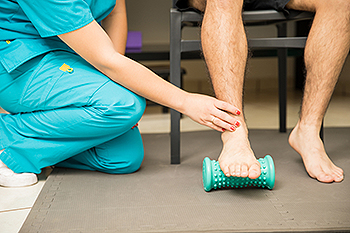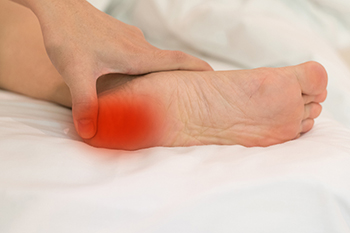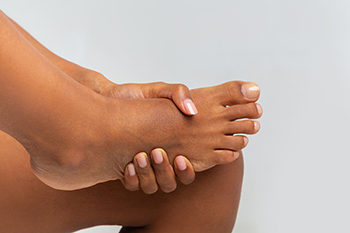September 2022
Preventing Foot Wounds in Children

If you are a parent, it is important for you to be doing all you can to minimize the extent to which your child could scrape or develop a wound on their feet. If your child is playing outside in the yard, you might, for instance, clear sharp objects like pointy twigs and rocks that could pierce your child’s skin. There are also many helpful ways in which a parent can immediately treat a wound if it develops on the child’s feet. For example, it might be a good idea to clean the affected area and dry it, applying a bandage. Importantly, if your child’s abrasion causes swelling or a fever, medical attention should be sought out. Contact a podiatrist today if you want to learn more about how to protect your child’s feet.
Making sure that your children maintain good foot health is very important as they grow. If you have any questions, contact one of our podiatrists of Bazzi Podiatry. Our doctors can provide the care you need to keep you pain-free and on your feet.
Keeping Children's Feet Healthy
Having healthy feet during childhood can help prevent medical problems later in life, namely in the back and legs. As children grow, their feet require different types of care. Here are some things to consider...
Although babies do not walk yet, it is still very important to take care of their feet.
Avoid putting tight shoes or socks on his or her feet.
Allow the baby to stretch and kick his or her feet to feel comfortable.
As a toddler, kids are now on the move and begin to develop differently. At this age, toddlers are getting a feel for walking, so don’t be alarmed if your toddler is unsteady or ‘walks funny’.
As your child gets older, it is important to teach them how to take care of their feet.
Show them proper hygiene to prevent infections such as fungus.
Be watchful for any pain or injury.
Have all injuries checked by a doctor as soon as possible.
Comfortable, protective shoes should always be worn, especially at play.
If you have any questions please feel free to contact one of our offices located in Detroit, West Detroit, Northwest Detroit, Sterling Heights, Hamtramck, Dearborn Heights, Madison Heights, Redford, and Livonia, MI . We offer the newest diagnostic and treatment technologies for all your foot and ankle needs.
Exercises for Plantar Fasciitis

Plantar fasciitis is one of the most common causes of heel pain. It occurs when a thick band of tissue, plantar fascia, that runs from the toes to the heel under the foot becomes inflamed. It causes a stabbing pain when you get up in the morning, but usually diminishes throughout the day. A number of exercises can help to stretch and strengthen the plantar fascia, thereby reducing pain. To stretch the area, first, while sitting in a chair, lift the big toe upward and gently massage the bottom of the foot. Repeat three or four times. Second, roll a tennis ball under your foot, back and forth. Third, standing up and holding onto a chair or wall for balance, push the toe of one foot against the heel of the other, stretching it. Hold for 30 seconds and then switch feet. Repeat. To strengthen the plantar fascia, sit in a chair and place a towel on the floor. Grab the towel with the toes and hold for 30 seconds. Change feet. This can also be done with a pencil. For more information on how to alleviate the pain of plantar fasciitis, please consult with a podiatrist.
Plantar fasciitis can be very painful and inconvenient. If you are experiencing heel pain or symptoms of plantar fasciitis, contact one of our podiatrists from Bazzi Podiatry. Our doctors can provide the care you need to keep you pain-free and on your feet.
What Is Plantar Fasciitis?
Plantar fasciitis is the inflammation of the thick band of tissue that runs along the bottom of your foot, known as the plantar fascia, and causes mild to severe heel pain.
What Causes Plantar Fasciitis?
- Excessive running
- Non-supportive shoes
- Overpronation
- Repeated stretching and tearing of the plantar fascia
How Can It Be Treated?
- Conservative measures – anti-inflammatories, ice packs, stretching exercises, physical therapy, orthotic devices
- Shockwave therapy – sound waves are sent to the affected area to facilitate healing and are usually used for chronic cases of plantar fasciitis
- Surgery – usually only used as a last resort when all else fails. The plantar fascia can be surgically detached from the heel
While very treatable, plantar fasciitis is definitely not something that should be ignored. Especially in severe cases, speaking to your doctor right away is highly recommended to avoid complications and severe heel pain. Your podiatrist can work with you to provide the appropriate treatment options tailored to your condition.
If you have any questions please feel free to contact one of our offices located in Detroit, West Detroit, Northwest Detroit, Sterling Heights, Hamtramck, Dearborn Heights, Madison Heights, Redford, and Livonia, MI . We offer the newest diagnostic and treatment technologies for all your foot and ankle needs.
Signs Your Child May Have Sever’s Disease

Calcaneal apophysitis is a foot condition that affects young teenagers and children. It is referred to as Sever’s disease, and it targets people in this age group who frequently participate in running and jumping activities. The growth plate in the heel is affected causing severe pain and discomfort and physical activities may have to temporarily be stopped as the healing process occurs. This condition happens as a result of excessive pressure that is placed on the growth plate, where it connects to the Achilles tendon. This tendon connects the calf muscles to the heel bone and can become sore and swollen when the growth plate endures this type of stress. You may notice your child limps while walking, or some children find it more comfortable to walk on their toes. There are specific stretches that can be performed which may be helpful in finding mild relief as well as wear shoes that fit correctly. If your child has heel pain, it is suggested that you confer with a podiatrist who can properly diagnose Sever’s disease and offer treatment techniques.
Sever's disease often occurs in children and teens. If your child is experiencing foot or ankle pain, see one of our podiatrists from Bazzi Podiatry. Our doctors can treat your child’s foot and ankle needs.
Sever’s Disease
Sever’s disease is also known as calcaneal apophysitis, which is a medical condition that causes heel pain I none or both feet. The disease is known to affect children between the ages of 8 and 14.
Sever’s disease occurs when part of the child’s heel known as the growth plate (calcaneal epiphysis) is attached to the Achilles tendon. This area can suffer injury when the muscles and tendons of the growing foot do not keep pace with bone growth. Therefore, the constant pain which one experiences at the back of the heel will make the child unable to put any weight on the heel. The child is then forced to walk on their toes.
Symptoms
Acute pain – Pain associated with Sever’s disease is usually felt in the heel when the child engages in physical activity such as walking, jumping and or running.
Highly active – Children who are very active are among the most susceptible in experiencing Sever’s disease, because of the stress and tension placed on their feet.
If you have any questions, please feel free to contact one of our offices located in Detroit, West Detroit, Northwest Detroit, Sterling Heights, Hamtramck, Dearborn Heights, Madison Heights, Redford, and Livonia, MI . We offer the newest diagnostic and treatment technologies for all your foot and ankle injuries.
Foot Pain May Be Indicative of Lupus

Foot pain and limited mobility may be indicators of a systemic disease called lupus. The symptoms may be like those of arthritis, and can affect the tissue structures in the foot and ankle. Additional signs of lupus include pain and swelling in the joints of the feet, skin lesions, and tenderness. Lupus is a chronic disorder, and the percentage of people who have accompanying foot pain is high. In severe cases, foot pain from lupus may lead to vasculitis and possible toe amputation. The ankle is often affected with this condition, and may cause considerable disability. This may lead to difficulty in completing daily activities, and lupus is considered to be a high risk condition concerning the feet. Patients may have difficulty with proper shoe fitting, and this may be a result of increased pressure on the feet from musculoskeletal dysfunction. If you are suffering from foot pain, it is strongly suggested that you are under the care of a podiatrist who can properly diagnose the source of the pain, and offer treatment recommendations.
When dealing with systemic disease of the feet, it is extremely important to check the affected areas routinely so that any additional problems are caught quickly. If you have any concerns about your feet and ankles contact one of our podiatrists from Bazzi Podiatry. Our doctors will assist you with all of your podiatric needs.
Systemic Diseases of the Feet
Systemic diseases affect the whole body, and symptoms usually are displayed in the feet. This condition can make a patient’s ability to walk unbearable. Systemic diseases include gout, diabetes mellitus, neurological disorders, and arthritis.
Gout – is caused by an excess of uric acid in the body. Common symptoms include pain, inflammation, and redness at the metatarsal/phalangeal joint of the base big toe. Gout can be treated by NSAIDs to relieve pain and inflammation, and other drugs that lower the acid levels in the body.
Diabetes mellitus – is an increase in the level of blood sugar that the body cannot counteract with its own insulin. Failure to produce enough insulin is a factor in Diabetes.
Diabetes of the Feet
Diabetic Neuropathy – may lead to damaged nerves and affect the feet through numbness and loss of sensation.
Peripheral Vascular Disease – can restrict the blood flow to the feet, and often times lead to amputation of the feet.
If you have any questions please feel free to contact one of our offices located in Detroit, West Detroit, Northwest Detroit, Sterling Heights, Hamtramck, Dearborn Heights, Madison Heights, Redford, and Livonia, MI . We offer the newest diagnostic and treatment technologies for all your foot and ankle needs.





